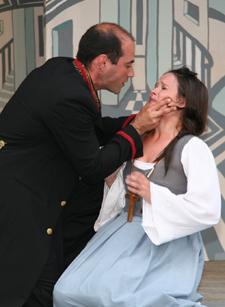Culture comes again to Prescott as the small Ontario town hosts their seventh season of the St Lawrence Shakespeare Festival.
On offer this year are the plays The Taming Of the Shrew and Measure for Measure, but it is the latter of the two which is perhaps the more challenging — and the more scandalous for a small town like Prescott.
“I think one of the reasons why it’s an interesting play is because it explores sexual hypocrisy and hypocrisy in general,” says gay Ottawa actor Kris Joseph, who plays the two lead roles of Claudio and Angelo in the play.
Claudio is a man sentenced to death for having sex outside of marriage, while Angelo, his accuser, has himself fled marriage commitments, unbeknownst to the Duke that appointed him.
“Sex is being outlawed, and this idea of the legislation of morality, it’s almost as though the government at the time in Vienna there is saying that the institution of marriage is failing, and we have to fix it by getting everyone to stop having sex, and if we do that, then the marriages will come back,” Joseph explains.
“The weird thing about Measure is that all the weddings that take place at the end, unlike any other comedy in Shakespeare’s canon, are essentially forced. Almost nobody enters into their wedding with any sense of pleasure or joy of any kind. And it seems like a sort of awkward afterthought, which I think Shakespeare did on purpose because he’s trying to get us to ask questions about morality and religious institutions, and things like that. So it’s very relevant.”
Angelo is a Ted Haggard figure, who publicly endorses the inclusion of sexual morality in law, but is keen to break those laws himself.
“Angelo recognises his own hypocrisy fairly early,” Joseph says. “The interesting thing is how far he lets it go before either he admits it himself, or eventually gets caught by everybody else.”
Despite playing two characters in Measure — as well as Hortensio in Taming of the Shrew — Joseph manages to keep each character separate in his head, but it’s where they meet that he finds fascinating.
“I draw interesting parallels between Hortensio and Claudio, for example, and that can be neat because they start to inform one another,” Joseph says. “It’s fun to have the contrast. Especially Hortensio, who is a much more shallow character, certainly compared to both Angelo and Claudio, so it’s nice to have that balance of something different. That’s what I enjoy.”
Joseph is one of the few working actors in Ottawa who actually makes his living acting full-time, though he didn’t always start out with theatrical ambitions.
“I never wanted to be an engineer,” Joseph says of his previous career at Nortel. “I’m never quite sure what was worse. I remember telling my mom that I liked boys back in University, and that was quite hard. And then when I told her that I wanted to abandon the engineering to become an actor, I think that might have been worse.”
“When Nortel let me go at the end of 2004, I haven’t looked back since. It’s been really terrific. And sticking it out in Ottawa has been hard, but it’s a great little town if you find the right niche.”
Come the fall, Joseph will be joining the National Arts Centre’s 40th Anniversary theatre company, performing in both A Christmas Carol and Mother Courage next year.


 Why you can trust Xtra
Why you can trust Xtra


